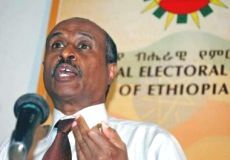Ethiopia’s parties challenge 55 percent of election results
By ANTHONY MITCHELL
ADDIS ABABA, Ethiopia, June 6, 2005 (AP) — Ethiopia’s political parties are challenging 55 percent of recent legislative polls, the electoral chief said Monday while setting up 10 teams to investigate complaints that may lead to a repeat vote in some areas.

|
|
Kemal Bedri, the chairman of the National Election Board of Ethiopia. (Reuters). |
Electoral chief Kemal Bedri was speaking to journalists after armed police surrounded and locked the gates into the country’s a university after students gathered there to protest the election outcome.
Dozens of police officers sealed main roads leading into the Addis Ababa University, barring journalists from the campus in the capital. The main opposition Coalition for Unity and Democracy said at least 50 protesters were arrested, but police officials were not able to comment immediately.
Kemal said investigations into the complaints would determine whether it was necessary to hold a repeat vote for the 299 disputed seats before July 8, when full results are expected to be released. They were originally set for release June 8.
The ruling party has so far won 302 seats and its allies garnered 26 out of 517 provisional results from the May 15 polls.
Opposition parties won 194 in the 547-seat lower house of parliament. They had only 12 seats in the last election in 2000, when international monitors were barred from observing the vote.
Rival political parties have lodged 61 types of complaints, including gunmen intimidating voters, people being forced to vote for certain parties, ballot boxes being stuffed or disappearing and the number of ballot exceeding those of registered voters.
Representatives of political parties and the National Electoral Board will investigate the complaints and observers from the African Union, European Union and the Carter Center will be invited to monitor the process, Kemal said.
“If we decide that indeed 300 constituencies should be investigated and also if the board, after investigating, determines that 300 constituencies we should have elections, then definitely we can say the balance of power will be determined through that,” he said.
The has been the most competitive in Ethiopia’s history and is a test of Prime Minister Meles’ commitment to more freedom and democracy.
Lawyers for the opposition are challenging in court Meles’ May 15 decree banning demonstrations and his move to put the capital’s police under his direct command.
They are also hoping to prevent the electoral board from releasing results for disputed seats.
